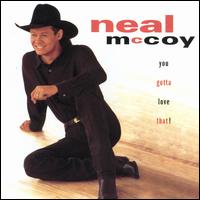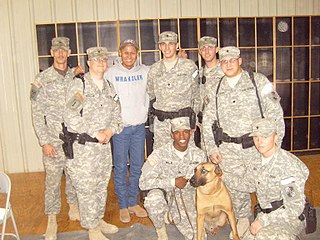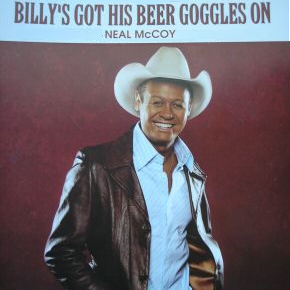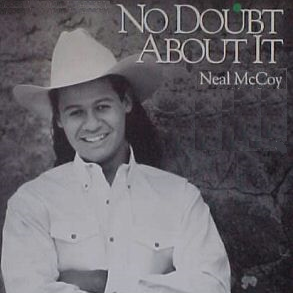
Hubert Neal McGaughey Jr., known professionally as Neal McCoy and previously as Neal McGoy, is an American country music singer. He has released 10 studio albums on various labels, and has released 34 singles to country radio. Although he first charted on the Billboard Hot Country Songs chart in 1988, he did not reach the top 40 for the first time until 1992's "Where Forever Begins", which peaked at number 40. McCoy broke through two years later with the back-to-back number one singles "No Doubt About It" and "Wink" from his platinum-certified album No Doubt About It. Although he has not topped the country charts since, his commercial success continued into the mid to late 1990s with two more platinum albums and a gold album, as well as six more top 10 hits. A ninth top 10 hit, the number 10 "Billy's Got His Beer Goggles On", came in 2005 from his self-released That's Life.

You Gotta Love That! is the fourth studio album by American country music artist Neal McCoy, released in 1995 via Atlantic Records. It includes the singles "For a Change", "They're Playin' Our Song", "If I Was a Drinkin' Man", and the title track. Of these, all but "If I Was a Drinkin' Man" were Top 5 hits on the Billboard Hot Country Singles & Tracks charts.

24-7-365 is the eighth studio album by American country music artist Neal McCoy. It is also his only album for Giant Records following the closure of his previous label, Atlantic Records. Singles from this album include "Forever Works for Me", "Every Man for Himself", and "Beatin' It In", which all charted on the Hot Country Songs charts in 2000.

"Wink" is a song written by Bob DiPiero and Tom Shapiro, and recorded by American country music singer Neal McCoy. It was released in April 1994 as the second single from his album No Doubt About It. Also the second consecutive Number One from that album, "Wink" spent four weeks at the top of the Billboard Hot Country Singles & Tracks chart in June and July of that year. In 1996, the song received the Robert J. Burton award from Broadcast Music Incorporated for being the most-performed country song of the year.
"They're Playin' Our Song" is a song written by Bob DiPiero, John Jarrard and Mark D. Sanders, and recorded by American country music singer Neal McCoy. It was released in April 1995 as the second single from his album You Gotta Love That. The song peaked at number 3 on the U.S. Hot Country Singles & Tracks chart and at number 8 on the RPM Country Tracks in Canada.

The discography of Neal McCoy, an American country music singer, consists of 10 studio albums, two compilation albums and 39 singles. Two of his singles, "No Doubt About It" and "Wink" both reached number one on the Billboard country charts, and seven more reached top ten. His albums No Doubt About It and You Gotta Love That are both certified platinum by the Recording Industry Association of America (RIAA), and his 1996 self-titled album is certified gold.

"Billy's Got His Beer Goggles On" is a song written by Philip White and Michael Mobley, and recorded by American country music artist Neal McCoy. It was released in March 2005 as the lead-off single to his album That's Life. It was McCoy's first release from his vanity label 903 Music. The song reached number 10 on Hot Country Songs in 2005, becoming McCoy's first Top 10 single since "The Shake" in 1997, and his last Top 10 to date.

"No Doubt About It" is a song written by John Scott Sherrill and Steve Seskin, and recorded by American country music artist Neal McCoy. It was released in December 1993 as the first single and title track from his album No Doubt About It. McCoy's rendition was his breakthrough single release, becoming his first Number One country hit in early 1994.

"Then You Can Tell Me Goodbye" is a song written by John D. Loudermilk. It was first released in 1962 by Don Cherry, as a country song and again as a doo-wop in 1967 by the group The Casinos on its album of the same name, and was a number 6 pop hit that year. The song has since been covered by Eddy Arnold, whose version was a number 1 country hit in 1968, and by Neal McCoy, whose version became a Top 5 country hit in 1996.
"This Time I've Hurt Her More Than She Loves Me" is a song written by Earl Thomas Conley and Mary Larkin and recorded by American country music artist Conway Twitty. It was released in October 1975 as the first single from the album This Time I've Hurt Her More. The song was Twitty's fifteenth number one country single as a solo artist. The single stayed at number one for a single week and spent a total of ten weeks on the country chart.
"You're My Jamaica" is a song written by Kent Robbins, and recorded by American country music artist Charley Pride. It was released in July 1979 as the first single and title track from the album You're My Jamaica. The song was Pride's twenty-second number one country hit. The single stayed at number one for one week and spent a total of ten weeks on the country chart.

"The Shake" is a song written by Jon McElroy and Butch Carr, and recorded by American country music artist Neal McCoy. It was released May 1997 as the only single from McCoy's Greatest Hits compilation album. The song reached number 5 on the Billboard Hot Country Singles & Tracks chart in October 1997. It peaked at number 7 on the Canadian RPM Country Tracks.
"You Gotta Love That" is a song written by Jess Brown and Brett Jones, and recorded by American country music artist Neal McCoy. It was released in January 1996 as the fourth single from his album You Gotta Love That. The song reached number 3 on the Billboard Hot Country Singles & Tracks chart in April 1996.
"For a Change" is a song written by John Scott Sherrill and Steve Seskin, and recorded by American country music artist Neal McCoy. It was released in December 1994 as the first single from his album You Gotta Love That. The song reached number 3 on the U.S. Billboard Hot Country Singles & Tracks chart and peaked at number 8 on the RPM Country Tracks in Canada.
"The City Put the Country Back in Me" is a song written by Mike Geiger, Woody Mullis and Michael Huffman, and recorded by American country music artist Neal McCoy. It was released in July 1994 as the third single from his album No Doubt About It. The song reached number 5 on the U.S. Billboard Hot Country Singles & Tracks chart and number 11 on the RPM Country Tracks chart in Canada.
"If I Was a Drinkin' Man" is a song written by Byron Hill and J.B. Rudd, and recorded by American country music artist Neal McCoy. It was released in August 1995 as the third single from the album You Gotta Love That. The song reached #16 on the Billboard Hot Country Singles & Tracks chart.
"If You Can't Be Good (Be Good at It)" is a song written by Troy Seals and Blue Miller, and recorded by American country music artist Neal McCoy. It was released in October 1997 as the first single from the album Be Good at It. The song reached #22 on the Billboard Hot Country Singles & Tracks chart.

"Going, Going, Gone" is a song written by Bob DiPiero, John Scott Sherrill, and Steve Cropper. It was first recorded by American country music artist Bryan White on his 1994 self-titled debut album.

"Love Happens Like That" is a song recorded by American country music artist Neal McCoy. It was released in June 1998 as the third single from the album Be Good at It. The song reached #29 on the Billboard Hot Country Singles & Tracks chart. The song was written by Aaron Barker, Ron Harbin and Anthony L. Smith.

"Take a Knee, My Ass " is a song recorded by American country music artist Neal McCoy, and was released on November 10, 2017. The song conveys McCoy's self-avowed patriotism, as well as his displeasure towards football players protesting police brutality during the national anthem.












